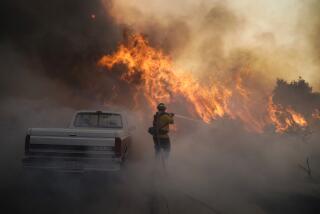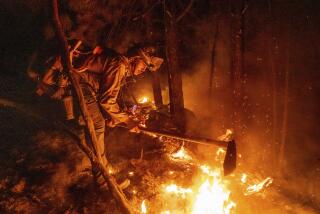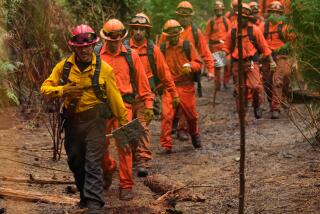Firefighters Head Back to Work, Still Smoldering
LONDON â British firefighters will leave the chill of their picket lines and go back to putting out fires this morning, a pause in a battle for higher pay that has mutated into a much larger showdown between resurgent union power and a Labor Party prime minister with a wary eye out for old political ghosts.
The strike, which began Nov. 22, has raised memories of 1970s and â80s labor militancy in Britain, when union muscle rolled over one Labor government before colliding with the immutable force of Thatcherism. Prime Minister Tony Blair may not have sought this confrontation with union leaders, but he is not shrinking from it, telling the country this week that the days of crippling work stoppages and inflationary wage demands âare over and are not coming back.â
Britainâs 50,000 firefighters have received no offer remotely close to the 40% pay increases they are seeking, which, for a four-year veteran, would mean a yearly salary of $45,000. Although they returned to work, their union has already announced another eight-day walkout to begin Wednesday.
After his governmentâs initially confused response to the strike, Blair took command this week, saying any significant pay increase must be paid for by âmodernizationâ of Britainâs fire service. That is widely interpreted as code for staff reduction, perhaps as much as 20% of the force.
And he warned that any large, unconditional settlement for firefighters would lead to similar demands across the public sector, a mantra repeated by government ministers, business leaders and the Bank of England throughout the week.
Blairâs uncompromising tack has political as well as economic motives. The last Labor government unraveled in 1979 over its inability to control the unions, a debacle that damaged the economy and left the party scarred for years as unworthy to govern. That reputation was shucked only by the general belief that Blairâs moderation could keep the unions at armâs length.
But after governing for five years in relative labor peace, the prime minister faces a movement that is replacing what it sees as co-opted leaders with younger, more radical unionists who are only too happy to show off their leftist credentials. Bob Crow of the Rail Maritime and Transport union famously keeps a bust of Lenin in his office.
The prime ministerâs tough line -- âBlairâs Done a Maggie,â declared Britainâs largest-circulation newspaper, the Sun, referring to former Prime Minister Margaret Thatcher of the Conservative Party -- has infuriated these leaders and raised the specter of ricocheting sympathy strikes throughout the public sector. A militant rump of London subway drivers, municipal workers and teachers walked off their jobs for short periods this week -- ostensibly over other issues, because such secondary strikes are banned under Thatcher-era laws.
âAll the people who are doing very, very well out of the current economic system have gone hysterical over paying a fair wage to a small group of workers,â said Andrew Murray, a senior official of ASLEF, the transport drivers union. âSmall-c conservatives in this country thought they had won a victory for all time, thinking they could go to their graves having dealt with the unions, and they are just dismayed that weâre back, lively and assertive.â
But although a union demonstration in solidarity with the firefighters is planned for Dec. 7, some labor leaders have privately blanched. Closer public scrutiny of the firefightersâ existing deal has raised eyebrows over their two-day, two-night workweek -- they are allowed to sleep during the night shifts -- and firefighters have balked at adopting new practices such as joint control rooms with police and ambulance services.
The firefighters also have resisted demands that they work overtime -- perhaps, critics say, because it might interfere with second jobs.
âThe union is in increasing danger,â said Matthew Taylor, director of the Institute for Public Policy Research in London. âThey thought they had public opinion on their side at the beginning, in part because of global sympathy for firemen after Sept. 11. But as the strike has gone on, a lot of people are saying, âHold on, look at the archaic nature of some of their practices.â And the firemen have moved from being heroes to looking a bit tarnished.â
Nor has their cause been helped by the apparently smooth pinch-hitting of the army, which stepped in to take over their duties. The government has noted that 19,000 soldiers have coped with fires while using a rough version of the joint control rooms the government wants to see become permanent.
From their picket lines, the firefighters sneer at the soldiersâ capabilities. âAnyone can squirt water on a fire, but these guys arenât saving buildings. They are just letting them burn down while protecting the building next door,â said London fireman Tony Martin, 45.
But the firefighters also admit to nagging worries that their pay demands have put some cherished privileges on the table.
âThis is not political with us. Weâre not trying to bring the government to its knees,â Martin said. âWe just want a decent living wage.â
More to Read
Sign up for Essential California
The most important California stories and recommendations in your inbox every morning.
You may occasionally receive promotional content from the Los Angeles Times.










